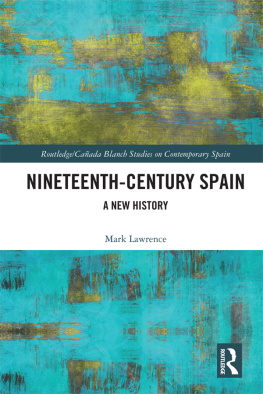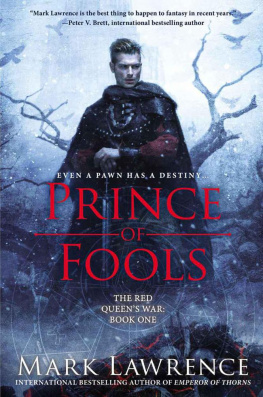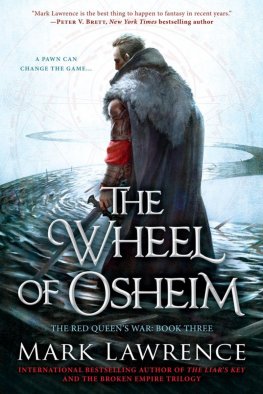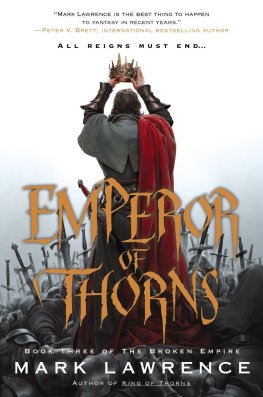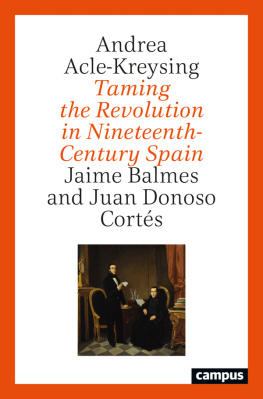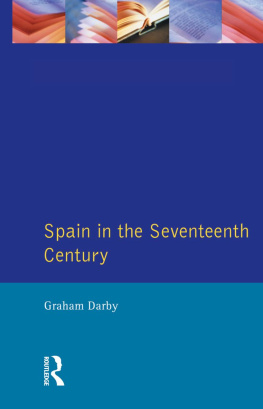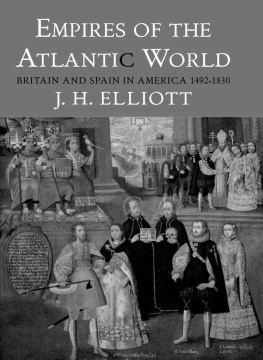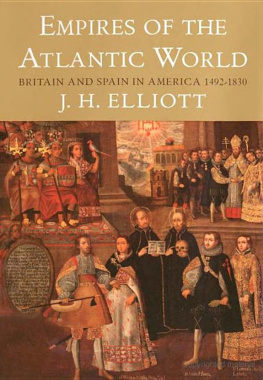Spain is a country normally seen as a laggard in terms of modernity but venerable in terms of tradition. Spanish identity is one of the oldest in Europe. As early as the eighth century, the Cult of Santiago grew as a sort of Christian Mohammed, or Holy Warrior, even if the origins of the Santiago myth, just like the adjective espaol (espagnole), lay in France rather than Spain.
Yet the nineteenth century remains one of the more mysterious periods in Spanish history. Sandwiched between the apparently more significant histories of early modern Spain and the Spanish Civil War, the nineteenth century evokes images of failure, of empires lost, of civil strife, of dynastic clashes, of militarism, and of progress held in check by the forces of tradition. Spain appeared backward in relation to northern Europe and even in relation to much of its own geographical periphery. Opinion in both Spain and abroad deemed the country eccentric from the European mainstream. Philosopher Montesquieus eighteenth-century critique of despotism modelled Spain as a corrupt, declining state riven with the Inquisition. The nineteenth-century American Hispanist and pioneer of scientific history William H. Prescott presented Spain as the antithesis of American liberty and modernity.
Spanish historians writing in the nineteenth century were usually also politicians who were only too aware of foreign impressions of their country, given their periods of exile caused by pendulum swings in Spanish politics and the elite links with European cultural capitals, especially with Paris. Although Spain did not produce a nineteenth-century historian of the grandeur of Ranke, Michelet, or Macaulay, two Spanish names do stand out. Modesto Lafuente, a former priest turned Liberal parliamentarian, published his thirty-volume Historia general de Espaa (185067) and Antonio Cnovas del Castillo, the architect of conservative liberalism in the last quarter of the century, published his national history in 1890. Lafuentes work stressed the heroism of the Spanish people since ancient history, and Cnovass work celebrated the centralisation and unity imposed after the Reconquista was completed in 1492. Both men relished the intrinsically Spanish events that forged their countrys identity, writing in the Hegelian sense of historicism, suspicious, mournful, but also acutely aware, of other European comparisons, especially for the century of failure in which they were writing.
Despite its importance, the nineteenth century remains the Cinderella of Spanish history, attracting nothing like the scholarship lavished on either the Golden Age or the Spanish Civil War. The twentieth-century Jesuit historian Federico Surez Verdeguer (19172005) thought that the sources, pro-liberal bias of his fellow historians, and the centurys closeness all rendered an objective account of the nineteenth century impossible.
Twentieth-century historians generally accepted the failure interpretation of modern Spanish history; indeed, several placed the divisions of the nineteenth century at the heart of explanations for the 1930s civil war. Historians no longer talk of Spains bourgeois revolution. But they do talk of the nineteenth-century liberal revolution. During the second half of the twentieth century, there was a Pamplona school of right-wing historians using modern historical methods to argue the superficial, often harmful, and foreign impact of liberalism on a society still wedded to tradition. They were countered by a Valencia school of liberal historians who presented a more optimistic view of liberalism and its role in modernising the Spanish state.
The Valencia school were instrumental in revisiting long-held assumptions about Spanish decline in the nineteenth century. Over the past decades, the failure interpretation has been challenged by a normalisation trend which has viewed Spains historical development as essentially part of a loosely defined European norm, especially in comparison with the rest of southern Europe.
Local histories continue to dominate Spanish academic publications, a product of the prevalence both of local publishing houses and regional regulation of universities. By contrast, nationwide survey histories of twentieth-century Spain continue to thrive, a sure sign that students continue to appreciate national histories organised chronologically. This book offers the first English-language survey of nineteenth-century Spain in several decades. This book integrates the international, military, political, and social history of Spain during its short nineteenth century in Spain (180898). What historians understand as a century is usually different from simple chronology. They consider the Western nineteenth century long, running from 1789 to 1914, or even from 1776 to 1914, whereas the twentieth century they consider short, running from 1914 to 1991. A recent, non-Eurocentric study of global history, even stretches the long nineteenth century from 1750 to 1914. Countries also have their own chronologies. Spain was centre stage neither in the French Revolution nor in the First World War, so the dates of its nineteenth century lie outside the European norm, not 17891914 but 18081898. In 1808, the implosion of Spains old regime was witnessed, setting in motion a national war against Napoleon, a violent independence process in continental Spanish America, and then a succession of civil wars in Spain itself, all with attendant pendulum swings in political extremes and notions of legitimacy. The year 1898 experienced the El Desastre, the loss of Spains remaining world empire and an attendant transformation in the political and intellectual shape of Spains new century. As the earliest European example of a post-imperial state, Spains short nineteenth century is deserving of a survey history of its own.
The nineteenth century also witnessed Spain fitfully transitioning from an old order of noble and clerical estates to a new order of property and laicism, a process enabled by liberal revolutions starting with the Constitution of Cdiz (1812), and achieved against entrenched opposition from the regions, countryside, and forces of Spanish tradition, most evidently during the Carlist Wars of 183340 and 187276. The Peninsular War (180814) created a politically interventionist army fed by generations of unwilling conscripts led by officers with political ambitions. Yet for all the political appeal of militarism, Spanish nation building remained weak, especially during the first half of the century, when it did not have the army as its servant. Military service did not turn peasants into Spaniards. Certainly, the anti-liberal forces of religion and tradition gradually reconciled themselves with the state in the second half of the century. But centralised nation building also had to contend with the growth of regional nationalism, especially in economically advanced Catalonia, even if for most of the nineteenth-century Catalanism was not inherently irreconcilable with the wider Spanish national identity.
Yet comparisons with other European states must be not be taken too far not because Spain was somehow absent from the European mainstream (as most nineteenth-century contemporaries, both Spanish and foreign, would have held) but because Spains nineteenth century was highly conflictive despite rather than because of attempts to inculcate a common identity. Whereas other European states also faced a lack of consensus about what constituted legitimate power (Italy, France), Spains crisis was of a different order. It alone spawned an enduring and insurrectionary legitimist movement in the form of Carlism, and Spain, more than most countries, experienced the dynamic linking patchy economic modernisation with repeated recourse to violence and extremism in politics. Internationally, too, Spains nineteenth-century decline contrasted with the rise of other large European states. From being a world empire and a still crucial factor in diplomacy at the start of the nineteenth century, by the end Spain had declined to second-rate status, occasional successes in foreign policy and foreign wars over the past century notwithstanding.

